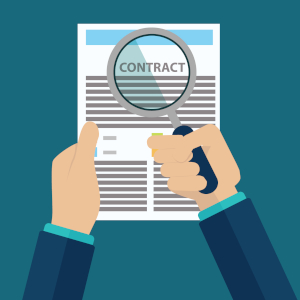Under the Magnifying Lens
Evaluate your company as if you were buying it

By Becca Anderson

A lot of business owners assume their business is fine if it is operating at a profit and has no major problems on the horizon. One of the best ways to test that is to pretend you are going to buy your company. What would convince you of its true value?
This article lays out the list of criteria a buyer would consider, and includes a checklist for you to review to be sure you’re in good position – to continue, to sell, or even to expand.
Financial Health

There’s nothing like hard numbers to show you where you really stand. They don’t lie, even though you can try to manipulate them to some extent. As you pretend you want to buy your own company, be hard nosed about the numbers. Don’t fudge anything.
You should have the following:
- Profit & Loss Statements (3–5 years) – Buyers look for consistent revenue, stable gross margins, and any sudden changes in expense patterns.
- Balance Sheets – Make a list of liabilities (loans, unpaid taxes, equipment leases).
- Cash Flow Statements – Strong cash flow is vital in a business with recurring costs like utilities and payroll.
- Tax Returns – Verify they match the P&Ls; discrepancies are red flags to potential buyers.
- Add-backs – Adjust earnings to account for owner perks or one-time costs. This helps you determine “true” EBITDA (Earnings Before Interest, Taxes, Depreciation, and Amortization) or SDE (Seller’s Discretionary Earnings).
You can begin to form a picture of what your company might be worth on the market by using the formula:
Purchase Price ÷ Adjusted Annual Profit = Payback Period
Buyers aim for 2-4 years in most laundry/dry cleaning deals.
Real Estate and Lease

There’s more to it than just location, location, location. Other factors can either increase the value of a business or send it tumbling.
If you own your property, good for you! Be sure to keep up with any zoning and permit usage actions that might limit what kind of solvent you can have on the premises. While owning your property is great, it can bring with it environmental liability. Have you had any soil contamination testing done? If so, be sure to keep a record of it. Being able to show you’re in good shape that way adds to the value of your company.
Have you kept your property condition up? Installed HVAC, put on a new roof, overhauled the plumbing or electrical system, improved drainage, expanded or improved parking? As the land-owner, these are all your responsibility, and they make your company shine in terms of value when they are done right.
If you lease your space (as is common) then you still have some evaluation to do in terms of the value of your business. What are your lease terms and do you have renewal options that give you stability for 10+ years? If you have a great lease, can it be transferred to a new owner? Are you paying market rates, or do you need to renegotiate? Buyers are leery of leases that are near expiration, or can’t be transferred with favorable terms, or that include high rates. They love stability and profitability for the long-term.
Equipment and Operations

Obviously, the array of equipment you have and its condition are key to making the business profitable. Bad equipment means lost revenue. Break it down so you can see the true value of what you have.
Equipment age and condition is something you can quantify. You know when you purchased each piece, and should have extensive maintenance records on every washer, dryer, press, finisher and dry cleaning or wet cleaning machine. Actual paperwork adds to the value of a business, as it indicates a well-run operation.
Have you kept up? Do you have a solid POS system? Automation? Conveyor tracking? Online scheduling? An app for customers to schedule the work and be able to see where their order is at any time? If you’re still using bits of paper stuck on the front counter, you’re actually devaluing your company, no matter how good your quality is. A potential buyer (which you’re pretending to be) would not be impressed. You shouldn’t be, either.
What are you getting out of all that equipment? Compare your pounds or pieces processed per day/week/month with industry benchmarks to see if you’re being efficient. A potential buyer would. And how are you utilizing your equipment to keep gas, electricity and water costs down? Your equipment may be shiny, but it is efficient?
Don’t forget to add in the value of inventory. Solvents, detergents, packaging supplies, etc. all have a positive impact on the bottom line.
Staff and Customer Base

The people side of a business is as important as the location, equipment or financials. It’s more than just how many customers you have and how long your employees have been with you, though those factor in. Buyers focus on these areas in calculating business health.
How is your staff? Are key pressers, spotters and drivers planning to stay with you? They add value to your overall company when they do. Your payroll obligations should be reviewed regularly – wages, benefits, union contracts, perks. Yes, they cost you money. But where are you without staff?
What happens when you are away? Does the company continue running smoothly because you’ve built a solid team? If your company is turn-key in the eyes of a potential buyer because it runs properly with or without the owner present, you have added real dollars to its value.
How are your customers? Do you know what they think of you? In this internet age, you have access to online reviews, Better Business Bureau ratings, and more. Do you review them? Do you interact with the customers who post about your company and maintain strong ties to them? What about your customer database (you have one, right?) In evaluating your business like a potential buyer, think about whether it’s in a usable format for a new owner, and how actively you work with it.
Market and Competition

While you might think this is the place to start when considering a business (whether someone else’s or, as in this exercise, your own), it is just one of the many factors that predict future value of a company.
Cities, towns and neighborhoods are often in a state of flux, with people moving in and out. That changes the demographics — sometimes drastically — over time. When did you last really dig down into what’s happening in your immediate area?
What’s the population, the median income, and how big is your competition radius? If you’ve had your area to yourself for a long time, keep in mind that an “undiscovered market” only has a certain window before others move in and take a chunk of the pie. Are you ready for that?
You have competitors. Are any nearby plants closing or opening? What does that say about the area?
Is there room for expansion, especially in the area of services you can offer, like wash-and-fold, pickup/delivery, alterations, or route service expansion?
Why do people come to your business? Is it because of the quality and value of the service you give, or is it because you are a personality around town and everyone knows you? If you were to leave and turn the company over to someone else, would your customers be loyal to the brand, or would they begin to look around? How much is your brand name, phone number, and customer list worth?
Legal and Risk Review

There are lots of pesky legal aspects to owning a business that can get away from you over time. You start out with a folder of all your various important documents – but when did you last review it and update those that require it? Here are some to consider:
- Business licenses and permits – Are they current and transferable?
- Environmental compliance – Potential buyers check solvent storage, waste disposal, and records.
- Pending litigation or complaints – Labor disputes, environmental actions, etc. are all liabilities in the process of valuing a business, since they can balloon and consume capital to deal with.
- Seller’s representations and warranties – What would you, as a buyer, want to see in writing in the purchase agreement to sway you to buy? What terms and conditions? What about a non-compete clause? Would you stay and help the new owner for a few months during the transition?
Deal Structure and Valuation

As you look at your business as if you were buying it, how would you actually structure the deal? Knowing this will help you position your business in the future for possible acquisition when the time comes for you to get out.
- Asset purchase vs. stock purchase – Asset deals protect buyers from hidden liabilities.
- Goodwill valuation – How much is brand name, phone number, and customer list worth?
- Inventory – Solvents, detergents, packaging supplies, etc.
- Transition support – Would you help a buyer as an employee for a few months post-sale?
That’s a lot of work!
If this sounds like a great deal of work in order to verify your company is healthy… it is! However, you should have most of this information at your fingertips already. If you don’t maybe now is the time to get it together. Keep a copy in your office, and store a second set of the information off-site. This will not only give you a fuller understanding of your business, but will come in very handy in the event of a disaster or other situation requiring that paperwork.
They call it “due diligence” when someone sets out to purchase a company. They will dig through all this and more. A healthy company has nothing to hide, and is able to put a finger on the pulse of the business at any given time. When you have a full valuation of your business, your options open up. Suddenly you know if you are able to buy out a competitor, want to take a step back, or just want to expand what you already have.
Put your company under the magnifying lens and see what you’ve really got.
Whether you’re evaluating your own business or looking at one you’re considering acquiring, we have a checklist for you. Click the links below to download the appropriate PDF file.
Related Posts
-
 Unlock Premium Pricing
No Comments | Jan 20, 2025
Unlock Premium Pricing
No Comments | Jan 20, 2025 -
 Assume it will happen
No Comments | May 20, 2025
Assume it will happen
No Comments | May 20, 2025 -
 Delivery is here to stay – Make your Pickup and Delivery unforgettable
2 Comments | Oct 20, 2020
Delivery is here to stay – Make your Pickup and Delivery unforgettable
2 Comments | Oct 20, 2020 -
 Locked In Loyalty
No Comments | Jul 24, 2023
Locked In Loyalty
No Comments | Jul 24, 2023
About The Author
Editor, Fabricare Canada magazine
Becca Anderson spent 17 years in public relations, advertising and corporate PR before joining Fabricare Canada in 2000. She was named editor in 2013, and welcomes feedback about the magazine via the contact form on this site.


